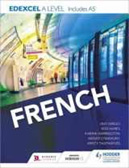








A-level course outline
Why choose Edexcel Advanced GCE in French?

We believe languages should appeal to all students. The new A-level in French has been developed to inspire all students who have an appreciation of the language, literature, film and culture of the French-speaking world.
Inspiring and engaging themes
Familiar and popular themes as well as some new content that provides clear links to some of the most fundamental and interesting aspects of the culture.
Popular literary texts and films
We offer a rich choice of literary texts and films that includes contemporary and more classical titles, together with authentic source materials from France and the wider French-speaking world.
Rewards creativity
We place an emphasis on spontaneity and grammar, as well as providing plenty of opportunities for students to apply their knowledge independently and creatively.
Clear and coherent structure
The qualification has a straightforward structure with four engaging themes - Changes in French Society; Political and Artistic Culture in Francophone Countries; Immigration and Multicultural French Society; The Occupation and the Résistance. The four themes are studied alongside two works (either two literary texts or one literary text and one film) assessed through two externally-examined papers and one non-exam assessment (oral).
Prescribed literary texts and films
Students are required to study two works from the list below. This can be either two literary texts or one literary text and one film.
Literary texts
Films
| French (EDX) A-level Specification | |
|
Paper 1: Listening, Reading and Translation Students are not permitted access to a dictionary during the examination. |
Section A: Listening (30 marks) A listening assessment based on a recording, featuring male and female French speakers. Students will respond to comprehension questions based on a variety of contexts and sources. Section B: Reading (30 marks) A reading assessment based on a variety of text types and genres where students will have to respond to comprehension questions. Section C: Translation into English (20 marks) An unseen passage to be translated from French to English. |
|
Paper 2: Written Response To Works And Translation This paper includes a translation exercise and two essays on either two literary texts, or one literary text and one film (students must not answer questions on two films). Students are not permitted access to a dictionary or any documentation relating to the works during the examination. |
Section A: Translation (20 marks) Students translate an unseen passage from English into French. Section B: Written response to works (literary texts) (50 marks) Students must write an extended response on either one or two of the literary texts listed in the prescribed literary texts and films. Section C: Written response to works (films) (50 marks) Students who answer only one question from a literary text in Section B must now write an extended response on one of the films. |
|
Paper 3: Speaking |
Students complete two tasks. Task 1 is worth 30 marks and Task 2 is worth 42 marks. |
|
Structure of the course This course will be taught for 6x 50 minute lessons per week. Independent study is set each week and deadlines must be adhered to. The course will involve additional reading, so please be prepared for this. Core Textbook: Edexcel A-level French - Hodder Education - ISBN 978-1-4718-5816-1 |
 |
Introductory Reading: Le Monde, Le Figaro newspapers. Le Nouvel Observateur magazine
Further Reading: Guy de Maupassant : Boule de Suif, La Mere Sauvage, Un Duel, Deux Amis (short stories) Joseph Joffo : Un sac de billes (novel)